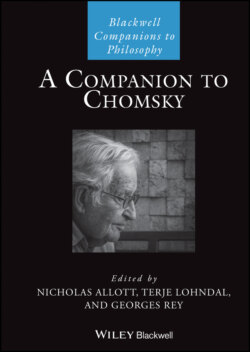Читать книгу A Companion to Chomsky - Группа авторов - Страница 20
1.8 Part VIII: Methodological and Other Explanatory Issues
ОглавлениеPart and parcel of Chomsky's rejection of the Positivism and empiricism that at least ideologically dominated much of philosophy and science up until about 1960 is his insistence on what he calls “the Galilean method,” which he argues is responsible for the success of our most serious sciences, such as chemistry, biology, and physics. There are several issues often included under this term: for example, an insistence on mathematical formulations; a belief in the ultimate “simplicity” of nature; and the central role of idealization in successful explanations. To keep the topic manageable, we (the editors) have prepared Chapter 33 that focuses on the last topic, idealization, alone, since that is what seems to us to be most important to Chomsky's work (the other topics are less essential and far more controversial; see Boeckx 2006 for discussion).
Crucial to Chomsky's work is the idealization he initially distinguished in terms of linguistic “competence,” which he thought was the only theoretically tractable component of the far too many things responsible for linguistic “performance,” or actual speech production. In order to avoid an excessively behavioral conception some associated with “competence,” he eventually replaced this talk by an even more idealized conception of an “I(nternal, intentional)‐language,” or a specific computational system of grammar that is one of a panoply of systems (e.g., of reasoning and decision making) responsible for what people think of as “language.” This is contrasted with what he calls “E(xternal, extensional)‐languages,” such as “English,” “French,” or “Mandarin,” the complexities of which Chomsky thinks we need to abstract away from in characterizing the underlying system. Chomsky reasonably claims that this sort of idealization is precisely what Galileo and Newton engaged in when they provided laws not of the complex motion of leaves in the wind, or clouds in a storm, but of objects falling in a vacuum, or of one point mass orbiting around another in empty space. We defend Chomsky's conception against the charges that it is nonempirical, leading to “unfalsifiable” theories, and ignores too many actual linguistic phenomena.
In fact, idealizations have been pursued in different ways by different proponents of a Chomskyan approach. As we have just noted, Chomsky himself has argued that systematic investigation of our linguistic abilities requires abstracting away from the interaction of the numerous systems presumably involved in performance, in order to narrow the focus to the competence embodied in the I‐language. He also assumes that there are other faculties or mental “organs,” and therefore recommends the same general methodology in investigating other aspects of cognition, such as the infant's ideas of objects in space and time, our number sense, and moral “grammar” (see references in section 6 above). In Chapter 34, Nicholas Allott and Neil Smith set out Chomsky's conception of such “competence” or “analytic” modules (as they have also been called) and their relation to processing, discussing three ways that it has been understood. But they also explore Jerry Fodor's different idealization, which he introduced with his influential notion of encapsulated “modules.” This was inspired by Chomsky's notion of faculties, but, unlike them, Fodor's modules concern specific processing systems: in the case of language the system responsible for how speech is perceptually understood. Allott and Smith provide an overview of evidence for modularity from dissociation data, where selective impairment of one ability leaves another ability intact, concluding that there is evidence both for Fodorian modularity of input systems, and for a central Chomskyan language faculty.
A related concern about Chomskyan linguistics has to do with its heavy reliance on speakers' “intuitions,” or verdicts about the acceptability and interpretation of sentences or phrases presented to them in books or lectures, as in queries about WhyNots. These don't seem like the experimentally controlled data with which serious science is normally concerned. Indeed, such intuitions can seem more like the armchair speculations of traditional philosophers that have been the object of much recent skepticism. In Chapter 35, Steven Gross reviews much of the recent discussion of this topic, discussing the similarities and differences between such linguistic judgments and the kinds of judgments about visual appearances on which vision theorists routinely rely.
Chomsky's interest in idealization leads him to be skeptical about theories of insufficiently idealized domains, not only of “E‐languages” and speech production, but of human behavior in general. To a first approximation, issues that might be amenable to an idealized explanation in terms of an underlying competence system he regards as problems while issues that involve massive interaction effects between systems such as the decision‐making of agents, he regards as “mysteries,” unamenable to scientific understanding. Collins calls attention in Chapter 36 to problems with the distinction as Chomsky draws it.
Many have wondered how someone so concerned with abstract idealizations of the sort Chomsky seeks in linguistics could also be as deeply concerned with such concrete and enormously complex phenomena as the kind of human behavior involved in politics. Part of Chomsky's view here is that political research is precisely not particularly theoretical, but involves simply paying closer attention to the mass of information about actual events of states and individuals in the world that, he argues, standard discussions in the public media often systematically ignore (Chomsky refers to the failure of people to learn the facts about present political realities as “Orwell's Problem.” Whereas “Plato's Problem” is how people can learn so much given the exiguousness of experience, Orwell's is: how can people know so little, given the actual accessibility of political information). Joshua Cohen and Joel Rogers examined this issue at length in their (1991) article from which Chapter 37 has been excerpted, and they bring to light some of the background assumptions of Rationalism and the Enlightenment generally that have informed both Chomsky's linguistics and his political discussions.
